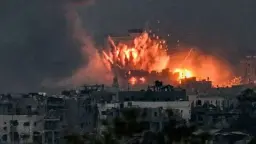In October 2023, war erupted between Israel and Hamas. Hamas launched rockets into Israel, causing casualties and taking hostages. Israel retaliated with a deadly operation and declared war on Hamas.
Both sides continue to exchange rocket fire, while Israel prepared for a possible ground assault. Gaza faces shortages of water, fuel, and supplies due to an Israeli aid blockade. The conflict poses a risk of spreading to Lebanon and Syria.
Background:
– The Israeli-Palestinian conflict originated in the late 19th century when tensions arose between Jewish immigrants and Palestinian Arabs in the region.
– In 1947, the United Nations proposed a partition plan that would divide Palestine into separate Jewish and Arab states. Israel was established in 1948, leading to the displacement of many Palestinians who fled or were expelled from their homes.
– Tensions remained high between Israel and its neighboring countries, including Jordan, Egypt, Syria, and Lebanon, who opposed the creation of Israel.
– Several wars, such as the Six-Day War in 1967 and the Yom Kippur War in 1973, resulted in territorial changes, with Israel gaining control over the West Bank, Gaza Strip, Sinai Peninsula, and Golan Heights.
– The Camp David Accords in 1979 marked a significant development, as it led to a peace treaty between Israel and Egypt, improving relations between the two countries.
– Despite these developments, the issue of Palestinian self-determination and governance remained unresolved, leading to continued tensions and conflicts.
– The first intifada, a Palestinian uprising, began in
1987, followed by the second intifada in 2000. These periods of increased violence saw numerous attacks and clashes between Palestinians and Israelis. Israel responded by constructing a barrier wall in the West Bank, aiming to prevent further attacks.
– In 2006, Hamas, an Islamist militant group, won the Palestinian legislative elections and gained control over the Gaza Strip, leading to factional conflicts with the Fatah-dominated Palestinian Authority.
– Clashes between Israel and Hamas occurred in 2014 and 2018, resulting in significant casualties and damage in Gaza and Israel.
– Palestinian unity efforts faced challenges, with ongoing disunity between Fatah, which governs the West Bank, and Hamas, which controls Gaza, hindering progress towards a unified Palestinian leadership and a negotiated solution to the conflict.
The International Community Involvement:
– Under the Trump administration, achieving an Israeli-Palestinian deal was a priority, but no comprehensive agreement was reached.
– In 2018, the US halted funding for the UN Relief and Works Agency, which provides support to Palestinian refugees, and moved its embassy in Israel from Tel Aviv to Jerusalem.
– Palestinians claim East Jerusalem as their future capital, while Israel considers all of Jerusalem its capital, leading to a contentious issue in peace negotiations.
– Trump’s “Peace to Prosperity” plan, unveiled in 2020, supported Israeli annexation and control over Jerusalem, which was rejected by the Palestinians.
– The UAE and Bahrain normalized relations with Israel in 2020 through the Abraham Accords, but this was met with rejection by the Palestinians, who viewed it as undermining their cause.
– An Israeli court ruling in Sheikh Jarrah in 2021, ordering the eviction of Palestinian families, sparked protests and clashes in Jerusalem.
– The protests in Jerusalem escalated in May 2021, leading to violence at the al-Aqsa Mosque compound, a holy site for both Muslims and Jews.
– In response, Hamas launched rockets into Israel, and Israel retaliated with airstrikes and artillery bombardments in Gaza.
– A ceasefire brokered by Egypt was reached on May 21, 2021, ending the intense fighting between Israel and Hamas.
– Concerns were raised over civilian casualties during the conflict, the potential involvement of Hezbollah from Lebanon, and the potential disruption of Israel-Saudi Arabia normalization efforts.
– In late 2022, a far-right and religious government led by Benjamin Netanyahu formed in Israel, with a focus on settlements in the occupied territories and limited LGBTQ+ rights.
– The year 2023 witnessed increased violence, including clashes, approvals of settler homes, military raids, and missile launches, contributing to the escalating tensions in the Israeli-Palestinian conflict.
– The October 2023 conflict between Israel and Hamas represents a significant escalation in the ongoing Israeli-Palestinian conflict, with both sides engaging in intense hostilities and posing a threat to regional stability.
– Israeli Prime Minister Benjamin Netanyahu confirmed preparations for a ground invasion of Gaza to destroy Hamas and rescue hostages.
– Netanyahu acknowledged accountability for the October 7 massacre by Hamas militants, promising an investigation afterwards.
– Israeli airstrikes have hampered relief operations by the UN agency for Palestinian refugees, impacting Gaza’s hospitals and causing resource shortages.
– The 19-day war is the deadliest of the five Gaza wars, with over 6,500 Palestinians killed and more than 17,000 wounded, while over 100 Palestinians died in the occupied West Bank.
– Independent verification of death tolls is challenging, as Hamas provides figures from hospital directors.
– Over 1,400 people, mostly civilians, have been killed in Israel, and 222 hostages, including foreigners, remain in Gaza.
– France is sending a Navy ship with aid to Gaza’s hospitals, and a plane carrying medical equipment will arrive in Egypt for delivery to Gaza.
– French President Emmanuel Macron visited Israel, expressing support and solidarity, and also met with Palestinian President Mahmoud Abbas and Jordan’s King Abdullah II during his Middle East tour.
Source Pindulanews










